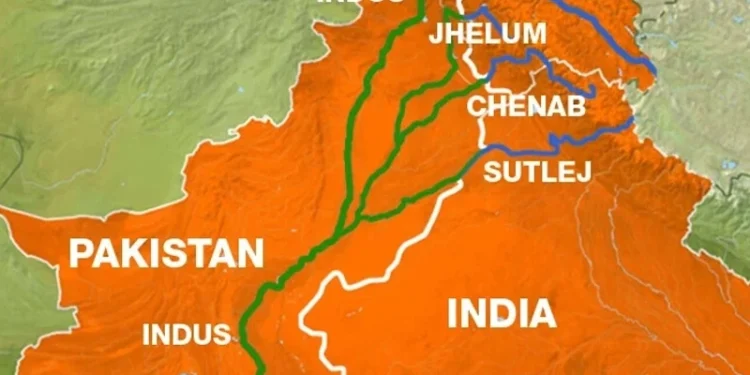On April 23, 2025, India announced the suspension of the Indus Waters Treaty (IWT)—a decision that marks a seismic shift in South Asian diplomacy. In the wake of a deadly terrorist attack in Pahalgam, Indian-administered Kashmir, New Delhi has accused Pakistan of harboring terror networks and responded not with missiles—but with a move arguably more destabilizing: targeting the region’s most vital natural resource.
Signed in 1960, the Indus Waters Treaty has long been held up as a model of successful conflict resolution. For over six decades, it has governed the distribution of the Indus River system’s waters between two bitter rivals—India and Pakistan—surviving wars, coups, and political upheaval. Its suspension is not just a diplomatic rupture—it is the breakdown of one of the few functional bridges left between these two nuclear-armed neighbors.
What Is the Indus Waters Treaty?

The Indus Waters Treaty, brokered by the World Bank and signed by Indian Prime Minister Jawaharlal Nehru and Pakistani President Ayub Khan, divides the six rivers of the Indus Basin.
-
India was granted rights to the eastern rivers: Ravi, Beas, and Sutlej.
-
Pakistan received control over the western rivers: Indus, Jhelum, and Chenab.
India retained limited non-consumptive rights over Pakistan’s rivers (e.g., for hydroelectric projects), while both countries agreed to share hydrological data and resolve disputes through a Permanent Indus Commission. Despite hostilities, the treaty functioned remarkably well—even during the 1965 and 1971 wars, the Kargil conflict of 1999, and post-Uri tensions in 2016.
Until now.
What Triggered the Suspension?
On April 22, 2025, militants opened fire on Indian tourists in Baisaran Valley, Pahalgam, killing 26 civilians and injuring dozens more. The attack, claimed by an obscure group calling itself the Kashmir Resistance, reignited India’s accusations of Pakistani state-backed terrorism. While Pakistan has denied involvement, Indian intelligence sources claim links between the assailants and Pakistan-based groups.
In an emergency meeting of India’s Cabinet Committee on Security, chaired by Prime Minister Narendra Modi, the following measures were announced:
-
Suspension of the Indus Waters Treaty
-
Closure of the Wagah-Attari border crossing
-
Expulsion of all Pakistani military attachés
-
Withdrawal of Indian military staff from Islamabad
-
A 48-hour deadline for all Pakistani military personnel to leave Indian soil
-
Acceleration of infrastructure to divert eastern rivers and harness water resources more aggressively
According to Indian Foreign Secretary Vinay Mohan Kwatra, “The Indus Waters Treaty has been exploited by Pakistan while it continues to shield anti-India terror groups. India cannot continue to uphold a treaty that Pakistan does not respect in spirit.”
Pakistan’s Response
Pakistan’s Foreign Office rejected the allegations and condemned the attack, warning India against what it called “water warfare.”
Power Minister Awais Leghari called the move “an act of aggression” and “a cowardly abuse of a humanitarian treaty.” Pakistan warned that disrupting water flow from upstream rivers violates international law and endangers the livelihoods of millions of Pakistanis.
Pakistan has convened its National Security Committee to craft a formal response and hinted at taking the case to the United Nations, the World Bank, and possibly the International Court of Justice.
Why This Is a Big Deal
The Indus River system is Pakistan’s lifeline. Nearly 90% of the country’s agriculture is dependent on its waters. Already one of the most water-stressed nations in the world, Pakistan’s vulnerability increases exponentially if India tampers with river flows—either by delaying releases, redirecting them for hydropower, or accelerating dam projects on rivers like the Chenab and Jhelum.
For India, this suspension marks a major doctrinal shift. It reflects the strategic thinking of a New Delhi less inclined toward diplomacy and more toward coercive leverage. In the words of one Indian analyst, “Why fight a war when you can turn the taps?”
What Happens Next?
India’s announcement is unilateral, and while the World Bank still officially guarantees the treaty, its ability to enforce it is limited.
Three possible scenarios now emerge:
-
Diplomatic and Legal Escalation
Pakistan may challenge India’s decision in international legal forums, invoking the World Bank’s role as guarantor. However, this path is time-consuming and may yield no binding enforcement. -
Hydrological Retaliation
India may begin work on river diversion and fast-track dam construction to maximize its rights over eastern rivers and stretch its interpretation of the treaty’s terms. -
Regional Instability and Militarization
This move may escalate tensions in Kashmir and along the Line of Control, especially if water shortages or provocations trigger unrest.
Meanwhile, China, which controls rivers flowing into India and Pakistan, may view this as an opportunity to expand its own influence by backing Islamabad diplomatically or financially.
Global Implications: The First Water War of the 21st Century?
The suspension of the Indus Waters Treaty is not an isolated South Asian squabble—it’s a test case for how the world manages transboundary water conflicts in an era of climate insecurity.
From the Nile Basin to the Mekong, nations are watching. If a 64-year-old, World Bank-guaranteed treaty between nuclear rivals can be scrapped overnight, what does that mean for other fragile water-sharing arrangements?
The Indus may soon become the world’s first major case of water as a weapon in geopolitical warfare.
The decision to suspend the Indus Waters Treaty is not just an act of retaliation—it’s a rewriting of the diplomatic rulebook.
By undermining one of the most successful examples of conflict-resolution in modern history, India may have gained strategic leverage—but at the cost of dismantling a rare pillar of peace. Pakistan now stands vulnerable. The region stands destabilized. And the world must reckon with the reality that even water—the most essential of shared resources—is now fair game in the politics of revenge.
In South Asia, peace once flowed through rivers. But in 2025, even the rivers are under siege.
Related stories:
India Passes Law to Seize Undocumented Muslim Properties
Pakistan Parliament Passes Resolution Urging India to Hold Plebiscite In Kashmir
At OIC Meeting Pakistan Calls For Resolution Of Kashmir & Palestinian Conflicts
Pakistan Watches with Concern as Former Ally Taliban Gets Closer to India
















